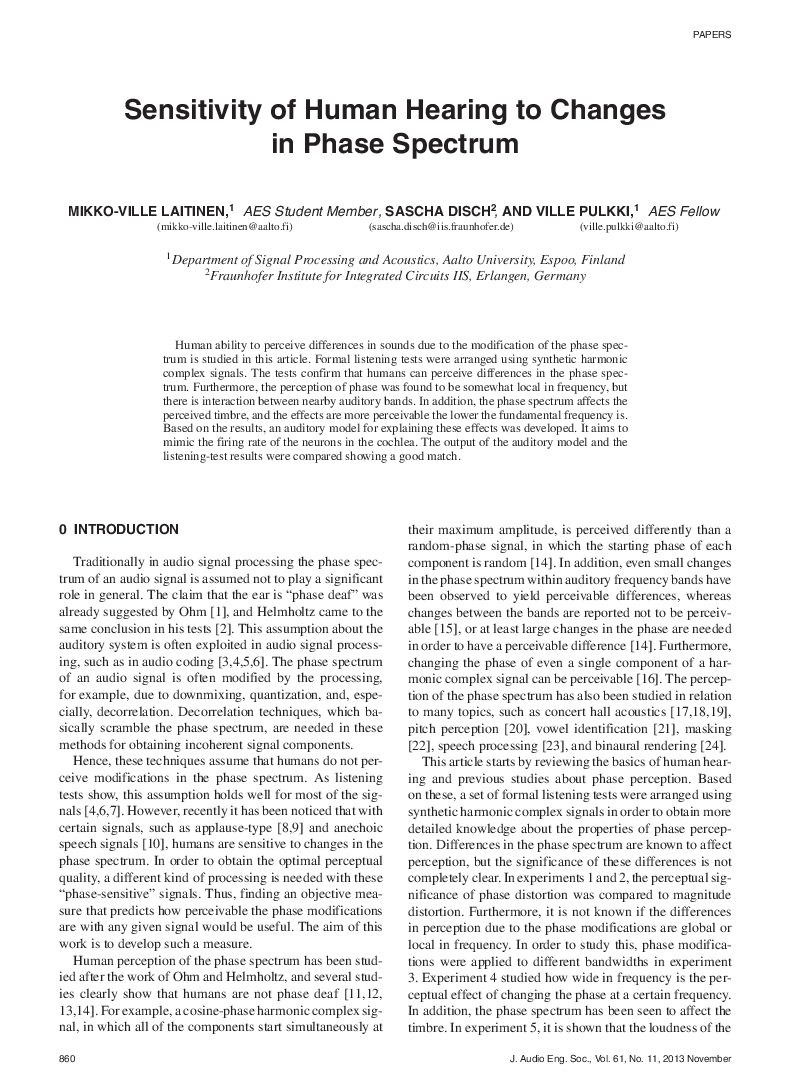Home / Publications / E-library page
You are currently logged in as an
Institutional Subscriber.
If you would like to logout,
please click on the button below.
Home / Publications / E-library page
Only AES members and Institutional Journal Subscribers can download
Conventional wisdom incorrectly assumes that changes to the phase spectrum of an audio signal are not perceptually relevant. The results of formal listening tests with synthetic harmonic complex signals showed that human beings are not “phase deaf.” The perceived difference resulting from randomization of the phase spectrum can be larger than those from randomizing the magnitude spectrum. Although the mechanism for phase perception is somewhat local in frequency, there are some influences on the perception of neighboring frequencies. The phase of a component at a certain frequency affects the perception of frequencies about one octave above and below. Signals for which the phase between the harmonics is aligned can be described as having a strong low pitch and “buzzy” quality, whereas random-phase signals are perceived to be colored, thinner, and absent of the buzzy quality.
Author (s): Laitinen, Mikko-Ville; Disch, Sascha; Pulkki, Ville
Affiliation:
Department of Signal Processing and Acoustics, Aalto University, Espoo, Finland; Fraunhofer Institute for Integrated Circuits IIS, Erlangen, Germany
(See document for exact affiliation information.)
Publication Date:
2013-11-06
Import into BibTeX
Permalink: https://aes2.org/publications/elibrary-page/?id=17068
(630KB)
Click to purchase paper as a non-member or login as an AES member. If your company or school subscribes to the E-Library then switch to the institutional version. If you are not an AES member Join the AES. If you need to check your member status, login to the Member Portal.

Laitinen, Mikko-Ville; Disch, Sascha; Pulkki, Ville; 2013; Sensitivity of Human Hearing to Changes in Phase Spectrum [PDF]; Department of Signal Processing and Acoustics, Aalto University, Espoo, Finland; Fraunhofer Institute for Integrated Circuits IIS, Erlangen, Germany; Paper ; Available from: https://aes2.org/publications/elibrary-page/?id=17068
Laitinen, Mikko-Ville; Disch, Sascha; Pulkki, Ville; Sensitivity of Human Hearing to Changes in Phase Spectrum [PDF]; Department of Signal Processing and Acoustics, Aalto University, Espoo, Finland; Fraunhofer Institute for Integrated Circuits IIS, Erlangen, Germany; Paper ; 2013 Available: https://aes2.org/publications/elibrary-page/?id=17068
@article{laitinen2013sensitivity,
author={laitinen mikko-ville and disch sascha and pulkki ville},
journal={journal of the audio engineering society},
title={sensitivity of human hearing to changes in phase spectrum},
year={2013},
volume={61},
issue={11},
pages={860-877},
month={november},}